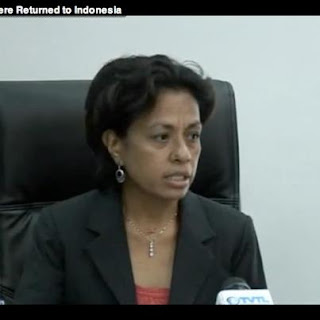 |
| LUICIA LOBOTA, eis ministra justica RDTL 2007-2012 |
Many people speak of the impunity
for crimes committed in Timor-Leste between 1975 and 1999. This issue is
everlasting issue and its cover diary conversation.
The Alkatiri Government from 2002 to
2006, in addition to the Ramos-Horta Government from 2006-2007 and the Xanana
Gusmao lead Governments from 2007 until 2012 have all had similar positions on
the matter of impunity for crimes against humanity. Our Government for the last 10 years has
taken the strategic position that Timor-Leste cannot and will not take the lead
in pursuing justice against senior Indonesian military leadership and their
Timorese partners from the crimes committed between 1975 and 1999. This position is due to the fact that
Timor-Leste reliance on good relations with Indonesia outweighs the
requirements for justice. While this may
be understood and to come extent grudgingly agreed with by many Timorese, many
are also disappointed that the Government goes too far sometimes in giving into
Indonesia’s pressure on the subject. The
Government states that unless Indonesia or the international community take the
lead then it is impossible for Timor-Leste to call for justice.
However the matter of justice and
impunity for crimes is not just a matter that complicates the relationship between
Indonesians and Timorese, but increasingly it is a matter of concern for
relations between Timorese and other Timorese, inside Timor-Leste.
Since 2001 and the Restoration of
Independence a worrying trends has appeared.
Over the past decade there have been large and small security
disturbances for which the vast majority of perpetrators have not been required
to pay the legal penalty for their actions.
These security incidents include but
are not limited to the following:
1.
The
2001 house burnings in Quelicai
2.
The
Sagrada Familia – Colimau-2000 confrontation in 2001 in Maliana
3.
The
Baucau police station attack in November 2002
4.
The
Dili riot in December 2002
5.
Martial
arts fighting in Ainaro in 2004
6.
The
PNTL-FDTL confrontation in Lautem in 2004
7.
The
March 2005 attempted armed robbery of ANZ Bank in Dili
8.
The
28 April 2006 Petitioner protest/riot
9.
The
May 2006 violence
10. The community violence throughout
Dili from June 2006 until Feb 2008
11. A number of the PNTL and the F-FDTL
discipline related crimes from 2008-2011
Additionally, a there is a trend
that sees important people not having to pay the penalty for their
actions. A number of politicians and
their relatives have been involved in fatal vehicle accidents since 2004 but have
never had to follow the law.
While the story is one of increasing
impunity in the ordinary day to day life in Timor-Leste it is actually more
complicated. The socio – economic
hierarchy in our community drives the decisions behind how and when the legal
rules will be bent in order to maintain harmonious relations or to “protect”
people from the law.
The case of F-FDTL solider Armindo
da Silva convicted in killing PNTL officers in May 2006 he spent some time in
“house arrest” and was then forced to retire from the army. However the army ensured that his retirement
was enacted in an honorable manner so as to protect his reputation. This was done due to the fact that he was a
24 years veteran of the armed struggle in FALINTIL and a close associate of senior
F-FDTL leadership despite his relatively low rank.
In the case of former Minister of
Justice Lucia Lobato convicted of corruption in June 2012 she was made an
example of for a number of reasons. She
was politically weak and the establishment sought to punish not only her but
also her political party the PSD. PSD
subsequently imploded in the July 2012 election and is no longer a political
force in Timor-Leste. However, Lobato
comes from a senior and important political family in Timor-Leste and she is
the niece of the first Commander of FALINTIL and the second President of
Timor-Leste Nicolau Lobato. As such
imprisoning her for the 5 years that she was sentenced is proving politically
difficult and she continues to walk free to the present. Interestingly, her husband has also been convicted
of company embezzlement and is also at large.
Other examples are that a number of
high level former soldiers, armed civilians, and the PNTL officers actively
engaged in the violence of 2006/2007 have become members of Parliament, senior
civil servants, Ministers, and business people.
For some – crime has been good business and highly profitable.
These are but a sample of some of
the examples of domestic Timorese style impunity. Why it can be understood that much of this is
necessary for short term political stability reasons it is a very worrying
trend if its becomes a chronic pattern and part of our culture.
This behavior is not what 200,000
Timorese died for. What do you think?

No comments:
Post a Comment